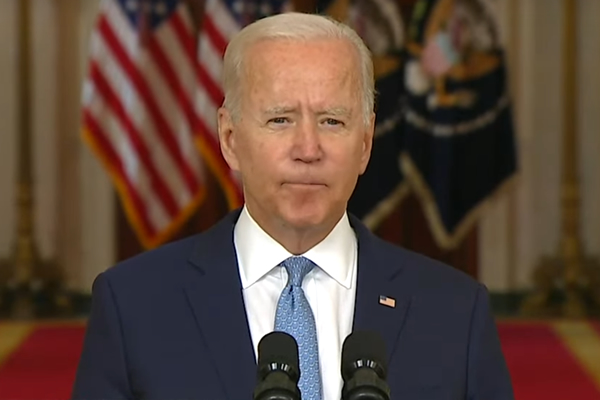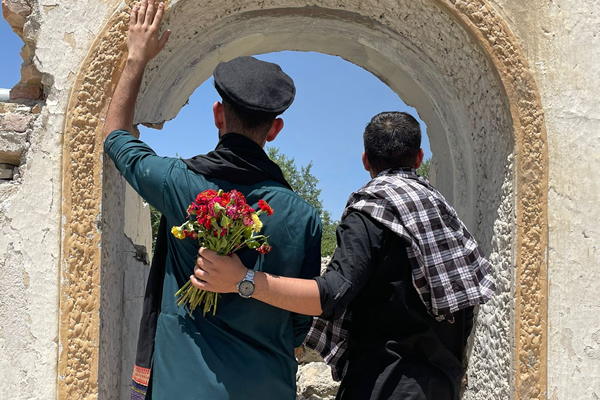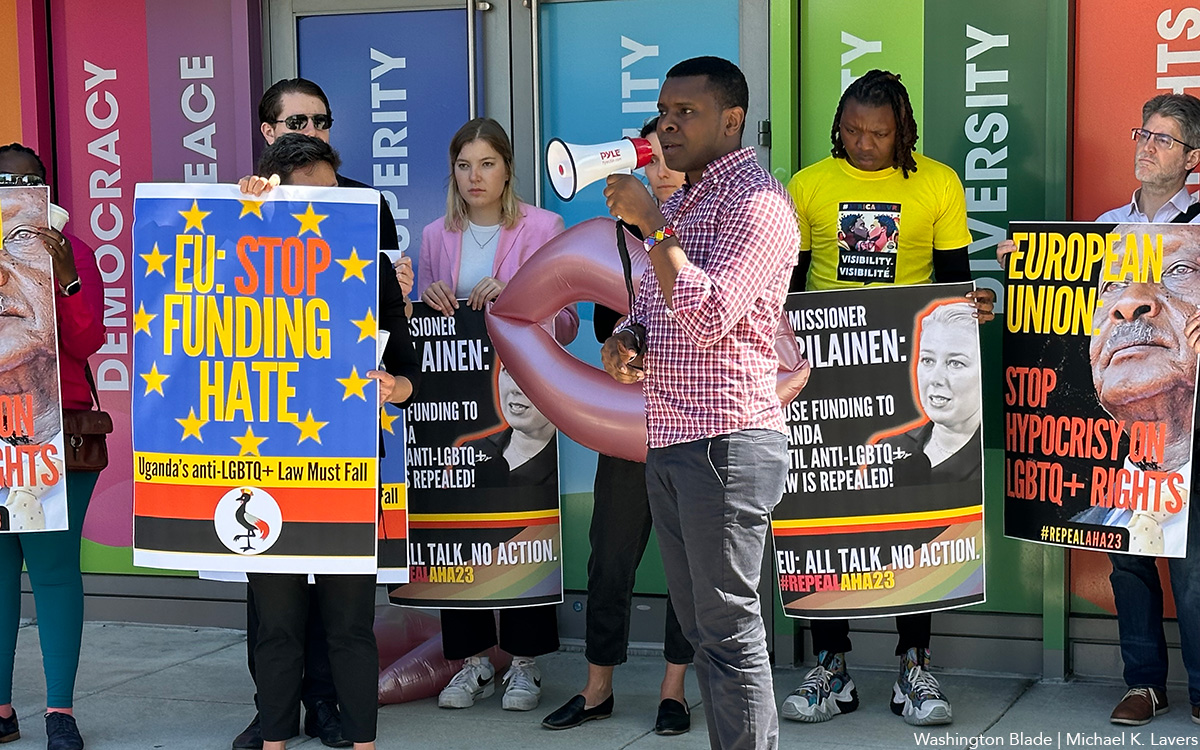World
Advocacy groups urge Biden to develop plan to protect LGBTQ Afghans
Taliban regained control of Afghanistan on Aug. 15

A group of six advocacy groups on Thursday urged the Biden administration to develop a 10-point plan to protect LGBTQ Afghans after the Taliban regained control of their country.
The Council for Global Equality; the Human Rights Campaign; Immigration Equality; the International Refugee Assistance Project; the Organization for Refuge, Asylum and Migration and Rainbow Railroad in a letter they sent to President Biden called for his administration to “prioritize the evacuation and resettlement of vulnerable refugee populations, including LGBTQI people, and ensure that any transitory stay in a third country is indeed temporary by expediting refugee processing.”
The nine other suggestions are below:
– Provide and effectively implement explicit “Priority 2” (P-2) access to the U.S. refugee program for the highly vulnerable population of LGBTQI individuals fleeing Afghanistan. Waive the application fee for any LGBTQI Afghan applying to relocate to the United States on an expedited basis via humanitarian parole and look favorably upon those emergency requests. Initiate a new program of Temporary Protected Status (TPS) for Afghans in the United States, including those paroled into the United States on an emergency basis.”
– Ensure that existing lists that have been collected by various governments of at-risk Afghans, including those who wish to flee because of their sexual orientation or gender identity, are carefully safeguarded so that they do not fall into Taliban or third-country hands and are not used to target individuals or family members. Use the lists as a basis for expedited P1 or P2 refugee processing or humanitarian parole for those who seek protection abroad.”
– Lift or expand the FY (fiscal year) 2022 refugee cap of 125,000 refugees accepted into the United States.
– Provide funding to support the temporary housing, livelihoods and security of LGBTQI refugees in third countries while they are being processed for refugee resettlement in the United States or elsewhere.
– Recognize NGOs that have been reliable partners in identifying and recommending LGBTQI Afghans to the State Department for protection and instruct U.S. embassies to process LGBTQI refugee applications on site when referred by these designated partners.
– Recognize for the purposes of refugee relocation, humanitarian parole or any other entry into the United States any same-sex Afghan partner as a spouse. Take an equally expansive view of the definition of family for LGBTQI relocation given the lack of legal recognition for LGBTQI partnerships in the region.
– Expand LGBTQI-sensitive resettlement programs in the United States and engage with NGOs and local communities to expand the U.S. capacity to absorb larger numbers of LGBTQI Afghan refugees in supportive and inclusive environments, including through new refugee sponsorship programs.
– Speak out forcefully against human rights abuses by the new Taliban regime and any increased targeting of vulnerable communities, including LGBTQI people, and use existing mechanisms to sanction and hold accountable perpetrators of human rights abuse. Negotiate explicit human rights monitoring access, with a particular focus on vulnerable communities including LGBTQI Afghans, when the mandate of the U.N. Assistance Mission in Afghanistan is renewed by the Security Council later this month.

The Taliban entered Kabul on Aug. 15 and toppled then-President Ashraf Ghani’s government.
A Taliban judge in July said the group would once again execute people if it were to return to power in Afghanistan. A gay Afghan person with whom the Washington Blade spoke earlier this week said they and their family fled their Kabul home because of the Taliban.
“I’m scared,” they said. “I can’t go outside … everything has totally changed.”
The groups in their letter to Biden said the Taliban “takeover of Afghanistan has focused international attention on the safety and livelihood of many vulnerable populations, including women and girls, and lesbian, gay, bisexual, transgender, queer, and intersex (LGBTQI) Afghans.”
“As the decision to withdraw from Afghanistan will be part of your legacy, so too will be the actions your Administration takes to ensure the well-being of these populations,” reads the letter.
The letter also notes the groups “are deeply disappointed that your administration did not press to extend the Aug. 31 deadline to evacuate more at-risk refugees from Kabul, but we are heartened by your pledge to continue to support refugee evacuation and resettlement in the coming weeks.”
“The United States bears a special responsibility not to abandon those we have encouraged along the path to democracy and human rights, and to act expeditiously to ensure their safety,” it says.
Canada is thus far the only country that has specifically said it would offer refuge to LGBTQ Afghans. Immigration Equality earlier this week said it spoke “directly” with 50 LGBTQ Afghans before the U.S. completed its withdrawal from the country on Aug. 30. “
The international community must act in concert to protect vulnerable populations now placed at risk,” reads the letter to Biden. “We urge the United States to increase and prioritize its immediate, medium-term and long-term efforts on behalf of the LGBTQI community in Afghanistan using these 10 protection priorities.”
European Union
Activists demand EU sanction Uganda over Anti-Homosexuality Act
Yoweri Museveni signed law on May 29, 2023

More than a dozen activists who protested in front of the European Union Delegation to the United States in D.C. on Thursday demanded the EU to sanction Uganda over the country’s Anti-Homosexuality Act.
Hillary Innocent Taylor Seguya, a Ugandan LGBTQ activist, and Global Black Gay Men Connect Executive Director Micheal Ighodaro are among those who spoke at the protest. Health GAP Executive Director Asia Russell also participated in the event that her organization organized along with GBGMC and Convening for Equality Uganda, a Ugandan LGBTQ rights group.
Ugandan President Yoweri Museveni last May signed the Anti-Homosexuality Act that, among other things, contains a death penalty provision for “aggravated homosexuality.”
The country’s Constitutional Court on April 3 refused to “nullify the Anti-Homosexuality Act in its totality.” A group of Ugandan LGBTQ activists have appealed the ruling.
A press release that Health GAP issued ahead of Thursday’s protest notes EU Commissioner for International Partnerships Jutta Urpilainen on March 6 announced more than €200 million ($212.87 million) for Uganda in support of “small business owners, young female entrepreneurs, agribusinesses as well as vital digital infrastructure projects in full Team Europe format with the European Investment Bank (EIB) and several member states.”
“These concrete initiatives will make a difference to aspiring entrepreneurs, Ugandan businesses and create jobs in multiple sectors,” said Urpilainen in a press release that announced the funds. “This is a perfect example of how Global Gateway can make a tangible difference for citizens and businesses and unlock the full potential of a partner country by working together.”
Convening for Equality Uganda on Tuesday in a letter they sent to Urpilainen asked the EU to review all funding to Uganda and “pause or reprogram any funds that go via government entities.” The protesters on Thursday also demanded European Commission President Ursula von der Leyen “to hold Ugandan President Museveni’s government accountable for this attack on human rights.”
Josep Borrell, the EU’s top diplomat, in a statement he released after Museveni signed the Anti-Homosexuality Act said the law “is contrary to international human rights law and to Uganda’s obligations under the African Charter on Human and People’s Rights, including commitments on dignity and nondiscrimination, and the prohibition of cruel, inhuman or degrading punishment.”
“The Ugandan government has an obligation to protect all of its citizens and uphold their basic rights,” said Borrell. “Failure to do so will undermine relationships with international partners.”
“The European Union will continue to engage with the Ugandan authorities and civil society to ensure that all individuals, regardless of their sexual orientation and gender identity, are treated equally, with dignity and respect,” he added.
Urpilainen last September in a letter to the European Parliament said the EU would not suspend aid to Uganda over the law.
India
Indian political parties for the first time include LGBTQ rights in election platforms
Voters will begin to cast ballots on April 19

The world’s largest democratic exercise will begin in India on April 19 as citizens begin to cast their votes in the country’s election.
This year’s election is different because national level political parties for the first time are promising to extend marriage rights to same-sex couples as part of their election platforms.
The Indian National Congress, one of India’s oldest political parties, promised after wide consultation that it would introduce a bill that would recognize civil unions between couples who are part of the LGBTQ community. The party, which has governed India for the majority of the period since independence from the U.K. in 1947, has refrained from taking a stance on laws that include Section 377, which criminalized consensual same-sex sexual relations.
Then-Health Minister Gulam Nabi Azad in 2011 when the INC was in power said homosexuality is a disease. He made the controversial comment while speaking at an HIV/AIDS conference in New Delhi, the Indian capital.
“Unfortunately, this disease has come to our country too,” said Azad. “Where a man has sex with another man, which is completely unnatural and should not happen but does.”
When the Delhi High Court was hearing the Naz Foundation case, the Home Affairs Ministry opposed the striking down of Section 377 based on its belief that homosexuality cannot be morally condoned. The INC never struck down Section 377, which criminalized homosexuality, in parliament.
A 5-judge panel on the Supreme Court on Sept. 6, 2018, decriminalized consensual same-sex sexual relations.
The Communist Party of India (Marxist) on April 4 unveiled its platform with a range of socialist commitments, including support for LGBTQ rights. Among these pledges is to amend the Transgender Persons (Protection of Rights) Act 2019 to address community concerns and ensure legal recognition and protection for same-sex couples akin to marriage.
The platform also outlined plans to introduce a bill similar to the Special Marriage Act of 1954, which allows partners to be listed as dependents and facilitating like inheritance, alimony in the event of divorce and other issues. The party further pledged to enact a comprehensive anti-discriminatory bill that would include LGBTQ people, ensure quotas in educational institutions and implement horizontal reservations in employment.
Addressing the issue of crimes against LGBTQ people, the platform promised to treat such offenses on par with crimes against heterosexuals. The platform also calls for tackling bullying, violence and harassment of gender non-conforming and LGBTQ people in educational settings, enforcing anti-hazing policies and combating hazing based on sexual orientation and gender identity.
The platform further touched issues related to transition and informed consent.
The Special Marriage Act of 1954 is a law that provides for civil unions among Indians and Indian nationals who live abroad, regardless of the religion or faith followed by either party. This law enables people from two different religious backgrounds to enter into marriage. Parliament in 2019 passed the Transgender Persons (Protection of Rights) Act that extended rights to trans people.
Brinda Karat, a former member of the Rajya Sabha, the upper house of the Indian Parliament, and leader of the Communist Party of India (Marxist), spoke with the Washington Blade and said the current government has homophobic ideas that are not acceptable to the party.
The ruling government under Prime Minister Narendra Modi is striving to secure more than 400 parliament seats in the upcoming election, aiming for a substantial majority.
Various polls conducted by Indian news organizations indicate a probable victory for the ruling Bharatiya Janata Party. In response to the BJP’s dominance, Congress and several national and regional parties have joined forces as the Indian National Developmental Inclusive Alliance.
This alliance comprises 26 opposition political parties. Despite its formation, however, there is no clear coalition strategy in place and only two parties have included LGBTQ-specific policies in their election platforms.
The Blade reached out to Congress’ spokesperson for comment, but has not received a response. The BJP also did not respond to a request for comment.
The party has yet to release its election platform.
Ankush Kumar is a reporter who has covered many stories for Washington and Los Angeles Blades from Iran, India and Singapore. He recently reported for the Daily Beast. He can be reached at [email protected]. He is on Twitter at @mohitkopinion.
Africa
Ugandan activists appeal ruling that upheld Anti-Homosexuality Act
Country’s Constitutional Court refused to ‘nullify’ law

Twenty-two LGBTQ activists in Uganda have appealed this month’s ruling that upheld the country’s Anti-Homosexuality Act.
The Constitutional Court on April 3 refused to “nullify the Anti-Homosexuality Act in its totality.”
President Yoweri Museveni last May signed the law, which contains a death penalty provision for “aggravated homosexuality.”
The U.S. subsequently imposed visa restrictions on Ugandan officials and removed the country from a program that allows sub-Saharan African countries to trade duty-free with the U.S. The World Bank Group also announced the suspension of new loans to Uganda.
Media reports indicate Sexual Minorities Uganda Executive Director Frank Mugisha and Jacqueline Kasha Nabagesara are among the activists who filed the appeal.
-

 Africa4 days ago
Africa4 days agoCongolese lawmaker introduces anti-homosexuality bill
-

 District of Columbia15 hours ago
District of Columbia15 hours agoReenactment of first gay rights picket at White House draws interest of tourists
-

 World4 days ago
World4 days agoOut in the World: LGBTQ news from Europe and Asia
-

 Arizona19 hours ago
Arizona19 hours agoAriz. governor vetoes anti-transgender, Ten Commandments bill











